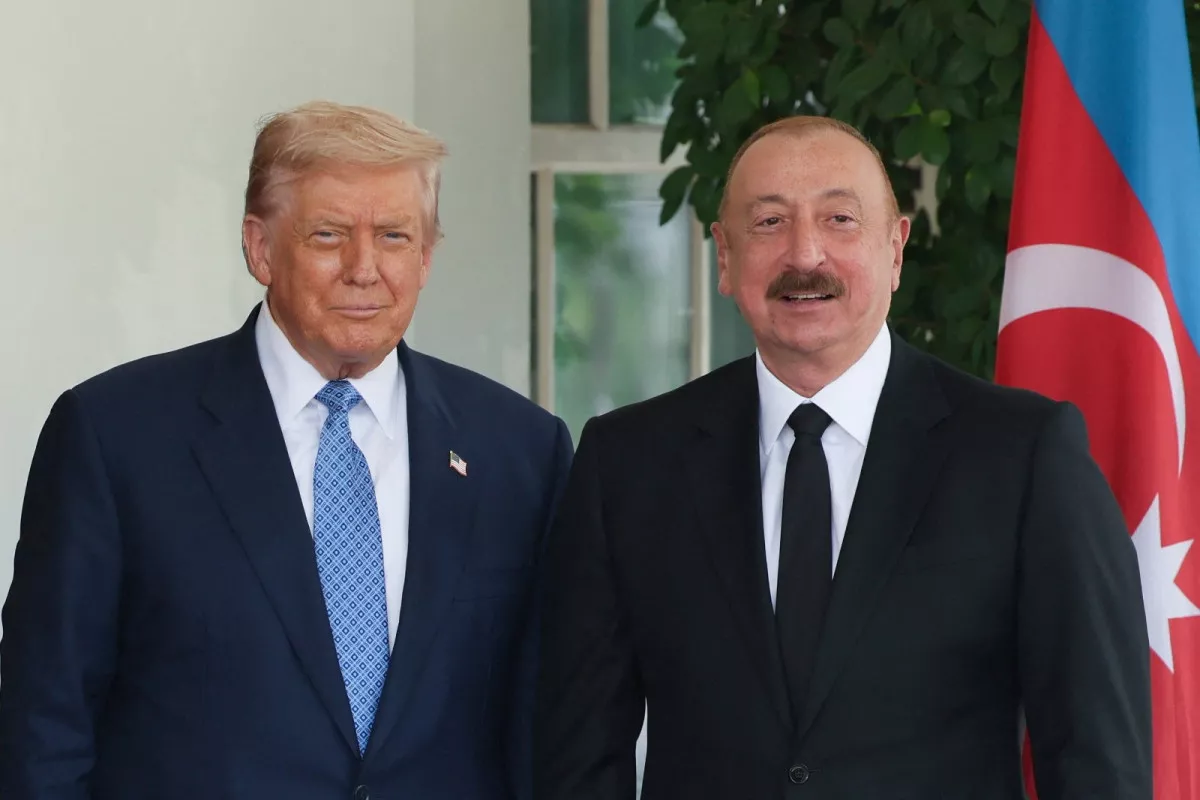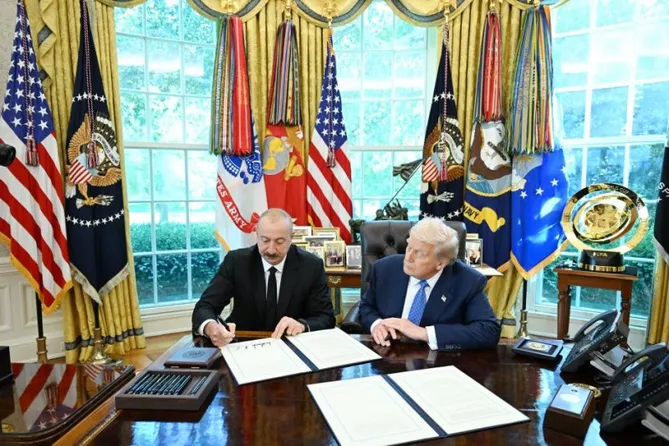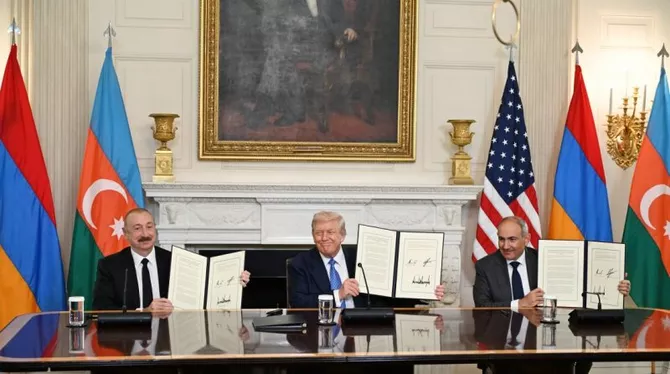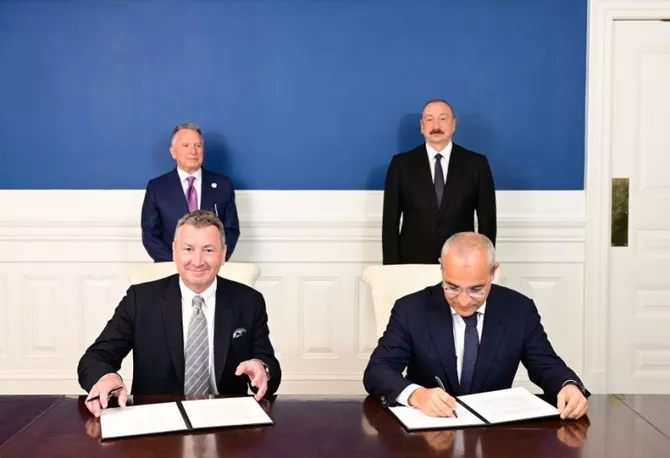
The recent visit of Azerbaijani President Ilham Aliyev to Washington at the invitation of U.S. President Donald Trump may well go down as one of the most consequential diplomatic milestones in the modern history of the South Caucasus. Far from being a mere protocol event, it was a decisive move that could reset the balance of power in the region, reshape geopolitical alignments, and open entirely new horizons of cooperation for Baku.
At the heart of the visit was the signing of an agreement to establish a Strategic Working Group to prepare a Partnership Charter-an ambitious framework covering everything from energy and defense industry collaboration to artificial intelligence and digital technologies. The breadth of this agenda signals a commitment to systematic, long-term cooperation rather than sporadic engagement.
For much of the previous decade, U.S.-Azerbaijan relations had been constrained by Washington’s underestimation of Azerbaijan’s strategic weight and its capacity to influence the regional balance. That era is now over. Baku has no intention of losing time or deferring opportunities, and the Washington talks were accompanied by meetings with American companies ready to invest in joint projects.

Photo: AZERTAC
This new chapter in bilateral relations did not begin overnight. Ties between Baku and Donald Trump were forged even before his election as president. Ilham Aliyev’s public support for Trump’s candidacy was rooted in a clear-eyed assessment: Azerbaijan needed a pragmatic, deal-oriented leader in the White House to reverse the deterioration of bilateral relations. That calculation has paid off.
Perhaps the most symbolically significant outcome has been the repeal-under Trump’s leadership-of the infamous Section 907 amendment to the Freedom Support Act, a relic of the early 1990s that imposed sanctions on Azerbaijan during the height of Armenian aggression. Though suspended in the early 2000s for logistical cooperation in Afghanistan, it was cynically reinstated by the Biden administration after the U.S. withdrawal from Kabul in 2022. Trump’s willingness to dismantle this outdated policy sends a powerful signal of restored trust.
For Azerbaijan, Section 907 has never been about economic survival-Baku is a donor country with a record-low external debt. It has always been about principle: the very existence of such sanctions casts a shadow over bilateral relations. Trump’s determination to confront resistance from the Armenian lobby on this issue is a measure of his seriousness.
The peace process with Armenia was another major theme. Baku’s position has remained consistent: peace must be based on internationally recognized principles-mutual recognition of sovereignty and territorial integrity, renunciation of territorial claims, non-use of force, border delimitation, establishment of diplomatic relations, and opening of communications. These principles have now been fully integrated into a finalized peace treaty text, with only one obstacle remaining-Armenia’s Constitution, which still contains territorial claims against Azerbaijan. A referendum next year could clear the way for a historic settlement.

Photo: AZERTAC
Yet the road to peace has been obstructed by a combination of poor advice from Yerevan’s “allies” and aggressive lobbying from figures such as Menendez, Schiff, Pelosi, and others who have consistently demonized Azerbaijan while giving Armenia false hopes of reversing the post-war reality. Opposition to the Zangezur Corridor has been one of their rallying cries.
That project-now officially rebranded as “The Trump Route for International Peace and Prosperity”-was given fresh momentum in Washington. Trump and Armenian Prime Minister Nikol Pashinyan signed an exclusive agreement transferring control of the corridor to the United States for 99 years. The plan envisions a 40-kilometer railway link, energy pipelines, and fiber-optic infrastructure, providing Azerbaijan with unimpeded access to its Nakhchivan exclave and enhancing Eurasia’s transport and energy connectivity. Nine American companies are already lining up to participate.
Control and security of the route will rest with the U.S., effectively ending Armenia’s exclusive authority over it. Ironically, this is a direct consequence of Armenia’s earlier refusal to accept Azerbaijan’s proposal for third-party security oversight. Now, offered under U.S. auspices, it is a deal Yerevan could not refuse.
The visit also yielded significant economic deliverables, including a Memorandum of Understanding between Exxon and SOCAR-an important step in reviving fossil fuel cooperation after years of Western financial reluctance. Azerbaijan is in talks with institutions such as the U.S. Export-Import Bank to finance oil, gas, and transport infrastructure projects once shunned under Europe’s hasty green transition policies.

Photo: AZERTAC
In parallel, Azerbaijan is setting the stage for deeper cooperation with the U.S. in artificial intelligence and digital transformation. Initial contacts made during the visit are expected to expand into concrete projects.
What emerged in Washington was not merely a set of agreements but the architecture of a strategic partnership-one grounded in political will, economic pragmatism, and long-term vision. For Azerbaijan, it is a chance to strengthen national interests while offering the region solutions built on mutual benefit. For the United States, it is an opportunity to anchor a reliable partner in a volatile geopolitical crossroads.
The anti-Azerbaijani coalition-stretching from Paris to Washington lobby halls-has been dealt a strategic defeat. The Armenian lobby’s protests against the Trump-Aliyev agreements are unlikely to reverse the new reality. The South Caucasus is moving into a new era, and this time, Baku and Washington are charting the course together.
Share on social media